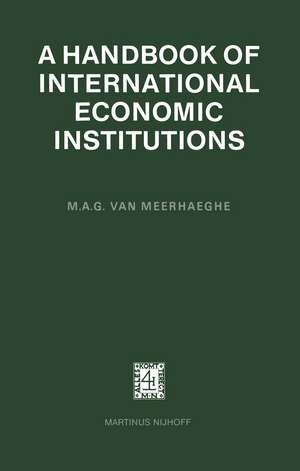A Handbook of International Economic Institutions
Autor M. A. G. van Meerhaegheen Limba Engleză Paperback – 13 oct 2011
Preț: 390.03 lei
Nou
Puncte Express: 585
Preț estimativ în valută:
74.63€ • 78.13$ • 61.75£
74.63€ • 78.13$ • 61.75£
Carte tipărită la comandă
Livrare economică 01-07 aprilie
Preluare comenzi: 021 569.72.76
Specificații
ISBN-13: 9789400988620
ISBN-10: 9400988621
Pagini: 468
Ilustrații: XXII, 441 p. 4 illus.
Dimensiuni: 156 x 244 x 25 mm
Ediția:1980
Editura: SPRINGER NETHERLANDS
Colecția Springer
Locul publicării:Dordrecht, Netherlands
ISBN-10: 9400988621
Pagini: 468
Ilustrații: XXII, 441 p. 4 illus.
Dimensiuni: 156 x 244 x 25 mm
Ediția:1980
Editura: SPRINGER NETHERLANDS
Colecția Springer
Locul publicării:Dordrecht, Netherlands
Public țintă
ResearchCuprins
1. The United Nations (UN).- 2. The specialized agencies.- 3. The Bank for International Settlements (BIS).- 4. Regional integration.- 5. Regional development banks.- 1: World Organizations.- 1. The International Monetary Fund.- 2. The World Bank Group.- 3. The General Agreement on Tariffs and Trade.- 4. The Commodity Agreements. The United Nations Conference on Trade and Development (UNCTAD).- 2. European Organizations.- 5. Benelux.- 6. The Organization for Economic Cooperation and Development.- 7. The Council for Mutual Economic Assistance.- 8. The European Communities.- 9. The European Free Trade Association.- Conclusion.- Appendix: Member States of International Organizations.- List of Articles.- Index of Authors.- Index of Subjects.
